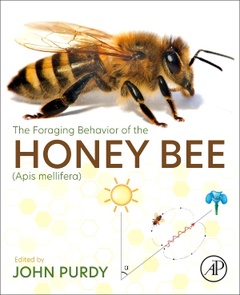The Foraging Behavior of the Honey Bee (Apis mellifera, L.)
Coordonnateur : Purdy John

The Foraging Behavior of the Honeybee (Apis mellifera, L.) provides a scholarly resource for knowledge on the regulation, communication, resource allocation, learning and characteristics of honeybee foraging behavior at the individual and colony level. Foraging, in this context, is the exploration of the environment around a honey bee hive and the collection of resources (pollen, nectar, water, etc.) by bees in the worker caste of a colony. Honeybees have the unique ability to balance conflicting and changing resource needs in rapidly changing environments, thus their characterization as ?superorganisms made up of individuals who act in the interest of the whole.
This book explores the fascinating world of honey bees in their struggle to obtain food and resources in the ecosystem and environment around the hive. Written by a team of international experts on honey bee behavior and ecology, this book covers current and historical knowledge, research methods and modeling used in the field of study and includes estimates of key parameters of energy utilization, quantities of materials collected, and identifies inconsistencies or gaps in current knowledge in the field.
2. Honey bee adaptations for foraging
3. Honey bee foraging behavior, navigation, communication, and search patterns of individual bees
4. Energetics of foraging
5. Pollination and foraging ecology of individual honey bees
6. Delivery of resources by returning foragers
7. Colony-level adaptations for foraging
8. Modeling of colony and bee behavior
9. Honey bees as livestock
10. Specialized foraging – robbing, swarming, absconding
11. Knowledge gaps and future directions
- Establishes a basis of current knowledge on honeybees to build and advance understanding of their foraging behavior
- Addresses stressors such as habitat loss, climate change, pesticides, pests and diseases
- Presents concise concepts that facilitate direct traceability to the original underlying research
Date de parution : 10-2023
Ouvrage de 232 p.
19x23.4 cm
Thèmes de The Foraging Behavior of the Honey Bee (Apis mellifera, L.) :
Mots-clés :
Honey bee; Apis mellifera; behavior; foraging; communication; thermoregulation; navigation; pollination ecology; provisioning



